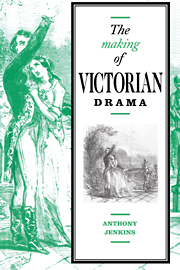Book contents
7 - A middle-class education
Published online by Cambridge University Press: 22 September 2009
Summary
lord darlington: Oh! she doesn't love me. She is a good woman. She is the only good woman I have ever met in my life …
cecil graham (lighting a cigarette): Well, you are a lucky fellow! Why, I have met hundreds of good women. I never seem to meet any but good women. The world is perfectly packed with good women. To know them is a middle-class education.
Lady Windermere's Fan (1892)Like Henry Arthur Jones, whose earnestness amused him, Oscar Wilde was an idealist. Jones, the disciple of Arnold, organized drama against the petty and suburban; Wilde, the disciple of Pater, marshalled his own personality against the drab and doctrinaire. Neither man cared much for reality. As a moral idealist, Jones looked at modern barbarism and found it unnatural; as an aesthetic idealist, Wilde, the spectator of his personal drama, considered actuality less interesting than his own thoughts about it:
From the high tower of Thought we can look out at the world. Calm, and self-centred, and complete, the aesthetic critic contemplates life, and no arrow drawn at a venture can pierce between the joints of his harness. He at least is safe. He has discovered how to live.
Wilde's intellect, shaped by artists and thinkers of all ages, allowed a comic detachment from himself and his times; his impressionable soul, whirling from one gem-like flame to the next, made him the slave of hedonism.
- Type
- Chapter
- Information
- The Making of Victorian Drama , pp. 196 - 228Publisher: Cambridge University PressPrint publication year: 1991

